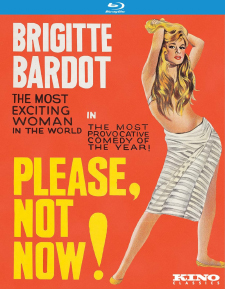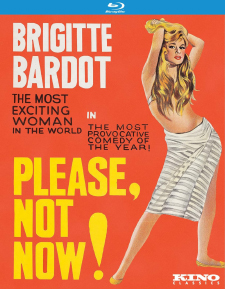Please, Not Now! (Blu-ray Review)

Director
Roger VadimRelease Date(s)
1961 (January 2, 2024)Studio(s)
International Classics (Kino Lorber Studio Classics)- Film/Program Grade: B
- Video Grade: A
- Audio Grade: A
- Extras Grade: B
Review
Brigitte Bardot was discovered by screenwriter and future director Roger Vadim. The two would marry and collaborate on a number of films in the 1950s and 1960s. Bardot achieved stardom in France and soon became an international sensation. The romantic comedy Please, Not Now! (also known as La bride sur le cou) stars the actress at the peak of her career.
Parisian model Sophie (Brigitte Bardot) discovers that Philippe (Jacques Riberolles), her photographer and boyfriend, has been secretly dating young American heiress Barbara Wilbury (Josephine James). Alain Varnier (Michel Subor), who has worshiped Sophie from afar, suggests she take revenge by having an affair with him and making sure Philippe knows about it. She rejects this idea and resolves to settle the matter the way her Corsican grandmother did — by shooting him. Alain warns Philippe that the danger is real, and the two-timer spirits Barbara off to an Alpine resort.
Sophie, meanwhile, has learned about their plan and sets off to the resort with her rifle packed and Alain in tow trying desperately to keep everyone safe and get her to notice him. Several comic mishaps and complications later, including entanglements with a hypnotist and a Saint Bernard, the two women reach out to each other, decide that their men are worthless, and team up against them.
Director Roger Vadim (Barbarella) showcases Bardot effectively in this airy souffle of a film. The young blonde beauty shows a flair for comedy as her character juggles the vendetta against her philandering boyfriend with the preventive measures of the shy fellow who longs for her to return his affection. With an easy manner in front of the camera, Bardot plays Sophie as a woman aware of her sensual effect on men but unwilling to exploit it, conveying an endearing kind of innocence.
Vadim gives Please, Not Now! a fast pace and some very funny set pieces involving bedroom shenanigans, slapstick, sight gags, and awkwardness. The opening title sequence sets the tone as it follows Sophie driving frantically through the streets of Paris on her way to work, cutting off cars left and right, making unexpected turns, nearly hitting other cars, and dodging pedestrians. A memorable scene involves a hypnotized waiter tilting backwards, stiff as a board, defying gravity. A dummy replaces the actor and carried effortlessly from one hotel room to another in the exact position he was in when hypnotized.
Late in the film, we get a chance to see more of Bardot, literally, in a dreamlike sequence when Alain, watching a nightclub dancer, imagines Sophie nude, undulating and dancing suggestively. Shot in soft focus, the sequence teases us with partial views through clouded glass. When we finally “see” a full frontal view, Bardot is obviously wearing a body suit. However, for the early 1960s, before nudity became more common in films, this was a pretty hot moment.
Please, Not Now! was shot by director of photography Robert Lefebvre on black & white 35 mm film with spherical lenses in the CinemaScope process and presented in the aspect ratio of 2.35:1. There are no major imperfections. Clarity, stability, and detail are all excellent. Details such as Bardot’s hair, patterns on wallpaper, street views, and a nightclub dancer’s outfit are nicely delineated. Grayscale is quite good. Blacks are deep and velvety. The scenes in the Alps have a Christmas card beauty, with snow blanketing the landscape and covering pine trees. In a scene of two couples in different rooms arguing, director Roger Vadim uses a split screen to show them simultaneously, a clever touch at the time.
The soundtrack is French 2.0 DTS-HD Master Audio. Optional English subtitles are an available option. The white subtitles occasionally are washed out by the white of the black & white film, making them difficult to read. Dialogue is clear and sharp through most of the film, though at a few points music overpowers dialogue. Background sound includes voices and ambient noise. The music is light and frothy, in keeping with the spirit of the film. The tune La Bamba is heard at various points.
Bonus materials on the Region A Blu-ray release from Kino Lorber include the following:
- Audio Commentary by Film Historian Alexandra Heller-Nicholas
- U.S. Theatrical Trailer (1:34)
Audio Commentary – Brigitte Bardot, who was married to Roger Vadim from 1953 to 1957, collaborated with him on several films before and after Please, Not Now! Their collaboration lasted longer than their brief marriage. Vadim’s directorial debut was And God Created Woman, which launched Bardot’s career as a global star. That film “shot both of them into the stratosphere in terms of international reputations.” The film showcased her as a sexually liberated, modern woman. Both Vadim’s and Bardot’s careers are discussed in detail. Bardot made several French films in the early 1950s and some Italian films as well. Plucking the Daisy established Bardot’s movie persona as the sex kitten. Naughty Girl was a huge box office success and “like a Doris Day movie with a more liberated edge.” Bardot epitomized a new kind of post-World War II woman. She received world-wide attention from the press and from fans, yet there was also a fear of what she signaled in a “hot cultural zeitgeist.” Her films represented changing sexual attitudes, and there were attempts in both France and the United States to have her films banned.
Incorporating many tropes of romantic comedy, Please, Not Now! is notable mostly for the presence of Brigitte Bardot, who truly shines and elevates a tepid comedy into something more with her star power. The film is a middling comedy, with the gags, both verbal and visual, centered on the attractions, disappointments, and longings of four young people. The film has charm, and its flirtation with sex and relationships adds a bit of spice.
- Dennis Seuling

